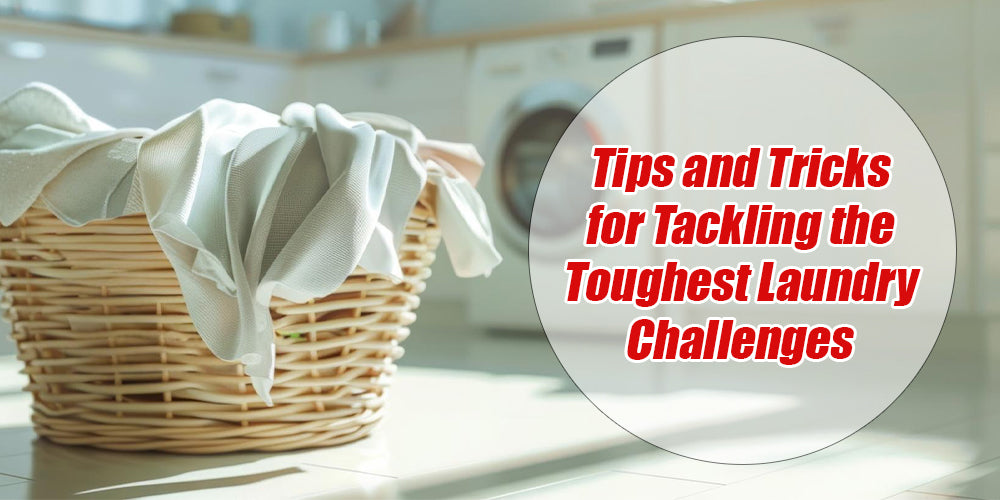Tips and Tricks for Tackling the Toughest Laundry Challenges

Doing laundry is a part of our daily routine, yet we all face challenges performing this task. Whether it is a coffee stain on our favourite garments or grass stains on kids' sports uniforms, tackling tough laundry issues feels like a never-ending battle. Effective laundry practices preserve the durability and lifespan of our favourite apparel and save valuable time and effort. The most common tough stains include oil and grease, which cling to fabrics with a vengeance, protein-based stains like blood and sweat, and tannin stains from coffee, tea, and wine. These stains are notorious for setting quickly, making them difficult to remove with standard washing methods. These challenges can leave anyone feeling frustrated and at a loss for solutions.
Designed with advanced cleaning technology, Selzer Ultrashine detergent powder and liquid make removing stubborn stains simple and easy. Powered with Gleamzymes, Selzer Ultrashine Detergents provide unbeatable cleaning power and long-lasting shine to your fabrics. Whether you're dealing with everyday messes or the toughest stains, Selzer Ultrashine offers a reliable solution to keep your laundry looking its best.
Different Types of Stains & Pro Tips to Tackle Them
Doing laundry can be a tricky task if you’re not aware of handling the different types of difficult stains. Understanding the nature of a stain will help you clean it more effectively without losing the colour or quality of the apparel. Here is a closer look at the three most common tough stains and some helpful tips to handle them like a pro:
- Oil and Grease Stains
Oil and grease stains are notoriously tough because they cling to our fabrics. We often get these stains on our apparel from cooking oils, butter, salad dressings, and even motor oils. The oily nature of these substances makes them resistant to water, meaning they don’t wash out easily with standard detergents.
Pro Tip
Pre-treat oil and grease stains with a small amount of Selzer Ultrashine Liquid Detergent. Apply the detergent directly to the stain and let it sit for 10-15 minutes before washing. This pre-treatment helps break down the oils, making them easier to remove during the wash cycle in a washing machine.
- Protein-based stains (e.g., blood, sweat, dairy)
Protein-based stains include blood stains, sweat, and stains from dairy products, that interact uniquely with water. When these stains are exposed to hot water, the proteins can coagulate, making the stains set in the fabric more firmly.
Pro Tip
Rinse protein-based stains with cold water first. This prevents the proteins from setting in the fabric. Then, use Selzer Ultrashine Detergent Powder for a deep clean. The powder’s powerful cleaning agents break down the proteins and lift the stains from our fabrics easily.
- Tannin Stains (e.g., coffee, tea, wine)
Tannin stains comprise, stains from coffee, tea, and wine, which are all together a different ball game; they can be quite a challenge to get rid of. These stains contain natural compounds that quickly bind to fabric fibres, making them tough to remove, if we do not treat them immediately.
Pro Tips
Blot tannin stains immediately and absorb as much of the liquid as possible. Avoid rubbing the stain, as it can spread and push it deeper into the fabric. After blotting, wash the stained area with Selzer Ultrashine Liquid Detergent. Its advanced formula helps dissolve tannins and lift the stains from your clothes.
The Importance of Pre-Treating Stains
Pre-treating stains before washing your clothes is very important to achieve the best laundry results. It provides a targeted approach to breaking down stubborn stains that regular washing alone may not completely resolve. When you apply the pre-treatment solution directly to the stained area, you instigate its powerful cleaning agents to penetrate and dissolve the stain effectively. This step is helpful while removing tough stains like oil, grease, and protein-based marks, that are resistant to standard washing methods. Pre-treating your stained fabric also helps address stains that have dried or set into fabric fibres, revitalising them and making them easier to remove during the wash cycle. Also, pre-treating your laundry preserves the quality and lifespan of your clothes. It ensures that your garments receive the best care possible, maintaining their cleanliness and appearance wash after wash.
Recommended Washing Machine Settings and Detergent Usage For Stubborn Stains
When dealing with stubborn stains, the right washing machine settings and detergent usage can make all the difference. Here’s how you need to optimize your laundry routine for effective stain removal and garment care.
- Choosing the Right Water Temperature
The water temperature you select plays a crucial role in removing different types of stains from fabrics. Like, cold water is ideal for stains from blood because it prevents the proteins from settling into the fabric, making them easier to lift during the wash. On the other hand, hot water is best for oil stains as it helps to dissolve and wash away grease more effectively.
Tip: Before washing, assess the type of stain you’re dealing with and adjust your water temperature accordingly. This simple adjustment can significantly improve your chances of successful stain removal without damaging your clothes.
- Optimising Detergent Dosage
Using the correct amount of detergent is necessary for optimising your cleaning results. Too little detergent may not adequately break down stains, while too much can leave residue on your clothes and even clog your washing machine over time.
How to Handle Delicate Fabrics
Delicate fabrics require extra care to maintain their quality and appearance over time. Fabrics like silk, wool, and lace are sensitive to harsh detergents and rough handling, which can lead to stretching, snagging, or shrinking of the delicate fabric. To preserve delicate garments try the following:
- Special Care for Delicates
Use a detergent specifically designed for delicate fabrics, such as Selzer Ultrashine Liquid Detergent. Its gentle formula cleans effectively while protecting the integrity of delicate fibres. Wash delicates in cold water on a gentle cycle to minimize agitation and reduce the risk of damage.
- Using Mesh Laundry Bags
Protect delicate items by placing them in mesh laundry bags before washing them. These bags provide a barrier against friction with other garments and prevent snagging on buttons or zippers. Ensure the mesh bag is securely closed before placing it in the washing machine to avoid tangling.
Post-Wash Tips
After washing your fabrics, it is essential to air-dry them properly, to maintain the shape of garments and prevent shrinkage and fading. Air drying on a rack is best, especially for delicate fabrics. For machine drying, use low to medium heat and remove clothes at the earliest. Address lingering odours by adding Selzer Ultrashine Liquid Detergent and vinegar to the wash cycle. This will effectively neutralise the foul smells from the fabrics.
We hope these practical tips for handling laundry challenges have been helpful to you. Stay updated with useful tips and tricks from Selzer. Subscribe to our blog. We regularly share insights on laundry care, stain removal techniques, and product recommendations to help you achieve the best results with your laundry routine.
Next time you face a tough laundry task, give these tips a try and experience the difference in your laundry results. We encourage you to share your laundry tips and experiences in the comments below. Your insights can help our community learn and grow together in mastering the art of laundry care.
SHARE:





